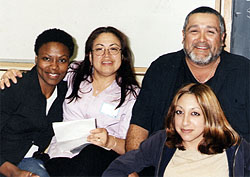Making Cootie Shots
Cootie Shots was collaboratively created by over five hundred theatre artists, youth, parents, educators, and community leaders.
This is how a typical Cootie Shots play development session worked…
Two mothers offer to host a playmaking session. A diverse group of about two dozen people gathers to brainstorm, write and improvise. There’s a thirteen-year-old girl and her mom, some teachers, a Catholic priest, a rabbinical student, a family of four, several therapists, a number of playwrights, several formerly homeless youth, the hosts, a grandmother and a toddler. All share a common goal: we all want to find creative ways to address the rise of hate crimes among youth.
The session begins with a question: “What’s the scariest thing you or your child had to face in elementary school?” A girl tells how she is ridiculed because she was overweight, another girl, because of her speech impediment. A mother and father tell us how both their son and daughter are harassed because their son is gay. A young man tells how he heard snickers when his recognizably Jewish name was called each day in class. One of the formerly homeless youth describes the place where he hid during recess to get away from the kids calling him “indio,” “blackie” and “n****r.”
Then the improvisations begin. Adults play children, teenagers play teachers to act out the stories, which are recorded for later transcription and refinement. Everyone has crucial input: “But that isn’t how a ten-year-old boy would react.” “Try this, it’ll make it funnier.” “That really fits with our school’s philosophy.” “That made me cry.” “You won’t be allowed to say that in a school setting, but that’s what’s really going on.”
This scenario was repeated many times in over sixty workshops held in various homes, classrooms and youth shelters with hundreds of participants. Each week, new issues and new stories were explored through discussion and improvisation. A team of educators, social service professionals, historians, artists, parents and youth then reviewed and approved Cootie Shots before the school tours began in 1999 and before the anthology was published in 2001.

